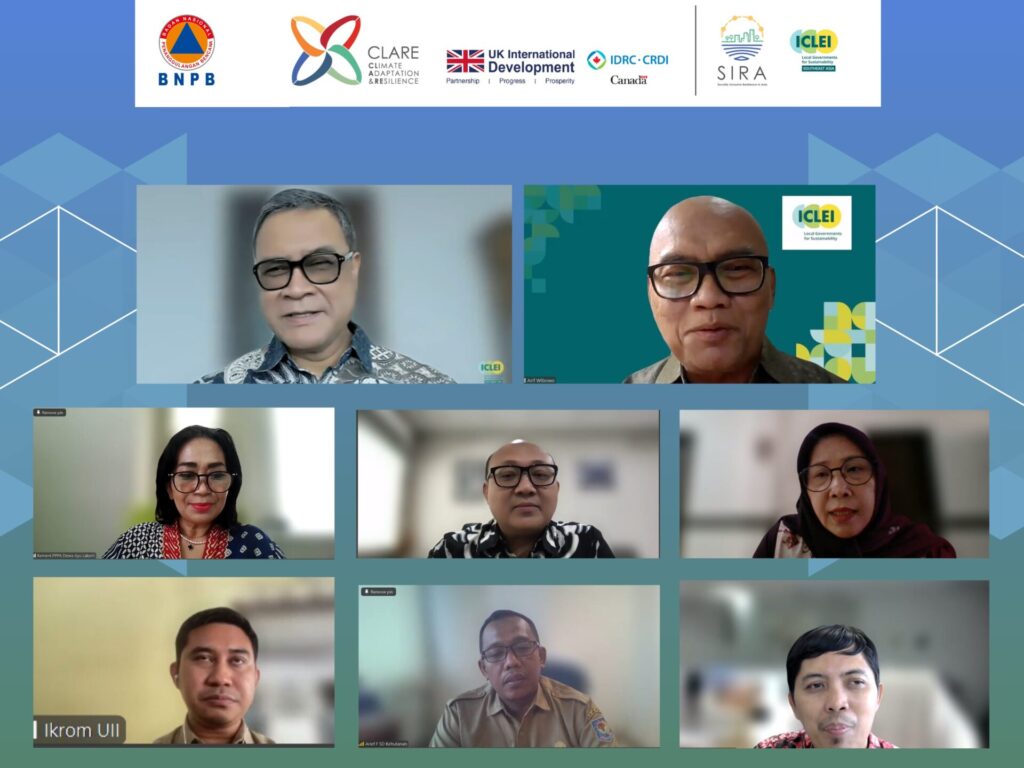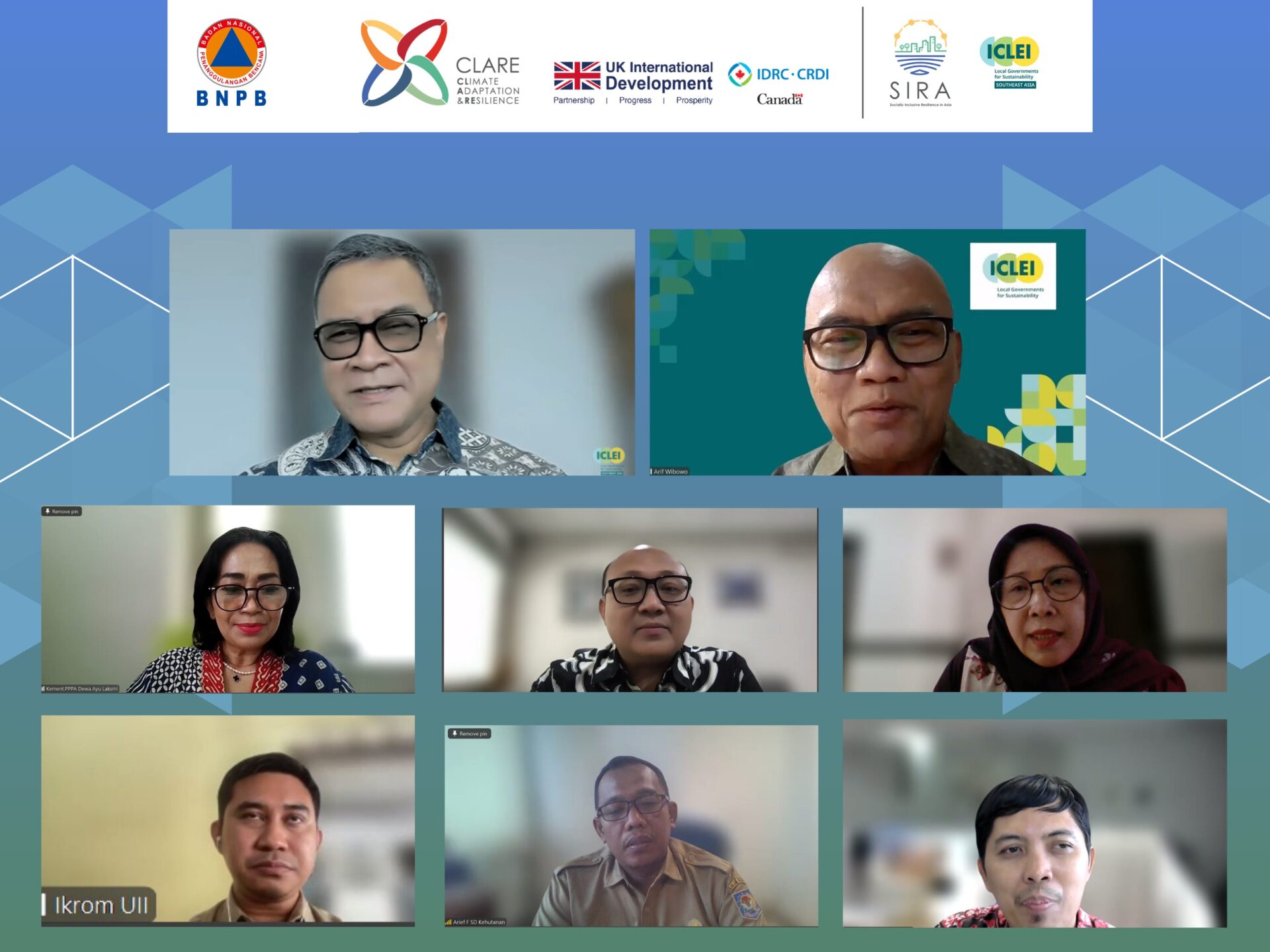Multi-level, multi-sector stakeholders from Indonesia call for inclusive resilience during national webinar
/

(In the picture left to right, per row): Panelist during the national webinar including, Dr. Raditya Jati, Deputy of System and Strategy at the National Agency for Disaster Management (BNPB); Arif Wibowo, Country Manager of ICLEI Indonesia; Dr. Dewa Ayu Lasmiati Jana Priati from the Ministry of Women Empowerment and Child Protection (Kemen PPPA); Nizhar Marizi, ST., M.Si., P, Director of Environment at the Ministry of National Development Planning (Bappenas); Dante Rigmalia, M.Pd, Head of the National Disability Commission ; Ikrom Mustofa, academic expert from the Islamic University of Indonesia (UII); Arif Fibrianto from the Ministry of Home Affairs; and Pratomo Cahyo Nugroho from BNPB’s Directorate of Strategy Development.
“Disaster risks are systemic and interconnected; there’s no such thing as a natural disaster. Disasters happen when people are unprepared.”
Dr. Raditya Jati, Deputy Minister of System and Strategy at the Indonesia National Disaster Management Agency (BNPB), made these insightful remarks during a nationwide virtual panel titled “Mainstreaming Social Inclusion in Regional Development for Enhanced Climate and Disaster Resilience,” held under the Enhancing Local Capacities for Socially Inclusive Resilience in Asia (SIRA) Project on 12 August 2025.
Jointly organized by BNPB and ICLEI Indonesia, the national webinar drew around 390 participants from local governments, including officials from disaster management, development, and environmental departments at the city, district, and provincial levels.
The event advocated breaking down silos between climate change adaptation, disaster risk reduction, and the Sustainable Development Goals (SDGs), calling for multi-level governance to incorporate social inclusion into regional planning documents such as the Regional Medium-Term Development Plans (RPJMD).
BNPB reports that over 97% of disasters in Indonesia are hydrometeorological (such as floods, landslides, droughts), with more than 3,000 events in 2024 and causing economic losses of IDR 22 trillion each year, according to data estimation from the Finance Ministry.
For example, the 2004 Aceh tsunami served as a wake-up call, with recovery costs reaching IDR 113 trillion over four years and resulting in 127,000 deaths.
As Dr. Raditya Jati noted, the figures suggest that the cost of ignorance can be severe, but effective disaster management, combined with resilience-building beyond risk reduction —including infrastructure, vulnerable communities, and resilience financing— is key to mitigating risks.
Arif Wibowo, Country Manager of ICLEI Indonesia, further shared that turning national policies into local plans, tailored to each region’s unique realities, is a key foundation for making things happen on the ground.
Bridging cross-sectoral Insights on mainstreaming social inclusion
The 90-minute panel, moderated by Selamat Daroyni, Senior Project Officer of ICLEI Indonesia, featured keynotes and interactive virtual question-and-answer sessions with experts and authorities, exploring cross-sectoral strategies for climate and disaster resilience and centering the discussions around social inclusion in regional development planning.

The panel was seated in by representatives from various ministries and organizations, including Home Affairs (Kemendagri), National Development Planning (Bappenas), Women’s Empowerment and Child Protection (Kemen PPPA), Environment and Forestry (KLHK), academia, the National Disability Commission, and stakeholders who brought critical insights to the discussion.
Arif Fibrianto, representing the Directorate of Synchronization of Local Government I at the Ministry of Home Affairs, highlighted the mandate for coherence between national and regional policies for climate resilience and inclusion efforts. It called for sustained coordination and evaluation with Bappenas to ensure that the recent 2025-2029 RPJMDs are aligned with the 2025-2045 National Long-Term Development Plan (RPJPN).
Echoing this, Nizhar Marizi, ST., M.Si., P, Director of Environment at Bappenas, also mentioned the need for inclusive low-carbon development to address the disproportionate climate impacts on marginalized and vulnerable groups in planning efforts, ensuring equitable and shared benefits for all.
Pertaining to city-level strategies, Pratomo Cahyo Nugroho from BNPB’s Directorate of Strategy Development pointed out that building disaster-resilient cities requires integrated planning using risk assessments (IRBI) and the Resilience Index (IKD) to boost capacity in seven key areas: policy, institutions, planning, funding, knowledge, prevention, and preparedness.
However, success depends on breaking silos through cross-sector collaboration, embedding inclusion meaningfully into local development plans (RPJMD, Renstra, Renja), with government agencies (OPDs) driving meaningful improvements in IKD scores.

Responding to gender inclusion, Dr. Dewa Ayu Lasmiati Jana Priati, Deputy Assistant for Gender at Kemen PPPA, introduced the concept of GETSI (Gender, Environment, Technology, Social Inclusion). She emphasized that women should no longer be seen as “pewaris” (inheritors) of non-responsive development but should instead be fully integrated into sectoral planning.
For instance, this includes the health sector (reproductive rights, facilities in shelters), the economy (empowerment, 30% parliamentary quotas), and the environment (access to water, food security, green economy, forestry, fisheries, energy).
Dante Rigmalia, Head of the National Disability Commission, advocated for meaningful participation, saying “Nothing about us without us.” She pointed out ongoing challenges that the sector experiences, including data gaps, stigma, accessibility issues, and exclusion from decision-making. People with disabilities face greater health risks and social stigma during disasters—often being overlooked in evacuations. Rigmalia called for disability-friendly procedures (SOP) and accessible tools to address these gaps.
Ikrom Mustofa, an expert representing academia from Indonesia Islamic University/UII, suggested fully embracing the penta-helix development model composed of the government, private, civil society, academia, and communities. Academia has a vital role in research, innovation, and policy co-creation to bridge the science–policy gap. He also called for stronger efforts to embed inclusion in international funding mechanisms and NDC reporting stating that resilience must go “From science to policy, from research to governance.”
The discussion led to key recommendations, namely the need to strengthen cross-sector collaboration to break silos and address systemic risks through integrated planning; ensure inclusive mitigation with accessible early warnings for persons with disabilities; and prioritize vulnerable groups through accessible tools, meaningful participation, and disability-friendly SOPs.
Funded by UK Aid through the Foreign Commonwealth and Development Office (FCDO) and the International Development Research Centre, Canada through the Climate Adaptation and Resilience (CLARE) programme and under the implementation of the ICLEI Southeast Asia and South Asia Secretariats, the SIRA Project aims to identify and address the immediate capacity needs of local governments in pursuing climate action that is inclusive and sustainable through a systematic and phased capacity strengthening programme anchored on South-South cooperation among four Asian countries: Bangladesh, Indonesia, Nepal, and the Philippines.
A recording of the virtual panel can be found HERE.
This news article was written by Juniarti Elisabeth, ICLEI Indonesia Membership and Communications Officer.
Categories
Countries
CLARE Pillars
CLARE Themes
CLARE Topics
Published
CLARE Projects
CLARE Partners


